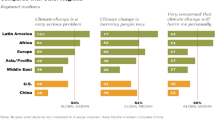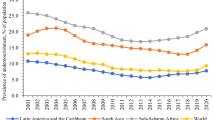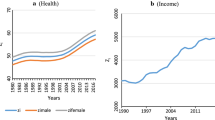Abstract
This study examines both unconditional and conditional roles of poor electricity access and dysfunctional institutions (control of corruption, government effectiveness, regulatory quality and aggregated institutional index) on health outcomes (captured by life expectancy, infant mortality, health expenditure and composite health outcomes) in 45 African economies for the period 2001–2018. Using the system of generalized method of moments (GMM), the study establishes the following findings: first, poor electricity access reduces human life expectancy, increases infant mortality rates and per capita health expenditure and worsens composite health outcomes. Second, institutions unconditionally exert a positive influence on life expectancy, negatively affect infant mortality, have no effect on health expenditure and are found to be indeterminate on composite health outcomes. Third, the marginal effects of interactions between poor electricity access and dysfunctional institutions on health outcomes have contrasting priors but are generally devastating, particularly for electrification schemes in national and urban centers. Fourth, the corresponding net effects of interactions between poor electricity access and the continent’s dysfunctional institutions on health outcomes are similar to that of the marginal effects of interactions. On a final note, the specific covariates driving each of the health metrics are dissimilar across the model specifications. In terms of policy, maintaining quality health status is undeniably contingent on the institutional quality dimensions of electricity access.

Source Authors’ conceptualization (2021)
Similar content being viewed by others
References
Acemoglu, D., & Robinson, J. A. (2006). De facto political power and institutional persistence. American Economic Review, 96(2), 325–330.
Adair-Rohani, H., Zukor, K., Bonjour, S., Wilburn, S., Kuesel, A. C., Hebert, R., & Fletcher, E. R. (2013). Limited electricity access in health facilities of sub-Saharan Africa: A systematic review of data on electricity access, sources, and reliability. Global Health: Science and Practice, 1(2), 249–261.
Ahlborg, H., Boräng, F., Jagers, S. C., & Söderholm, P. (2015). Provision of electricity to African households: The importance of democracy and institutional quality. Energy Policy, 87, 125–135.
Ajide, K. B., & Alimi, O. Y. (2019). Political instability and migrants remittances in Africa. GeoJournal, 84(6), 1657–1675.
Ajide, K. B., & Alimi, O. Y. (2020a). The conditioning role of institutions in environment-health outcomes nexus in Africa. International Economic Journal. https://doi.org/10.1080/10168737.2020.1824007
Ajide, K. B., & Alimi, O. Y. (2020b). The conditioning role of institutions in environment-health outcomes nexus in Africa. International Economic Journal, 34(4), 634–663.
Ajide, K. B., Alimi, O. Y., & Asongu, S. A. (2019). Ethnic diversity and inequality in sub-Saharan Africa: Do institutions reduce the noise? Social Indicators Research, 145(3), 1033–1062.
Ajide, K. B., & Raheem, I. D. (2016a). Institutions-FDI nexus in ECOWAS countries. Journal of African Business, 17(3), 319–341.
Ajide, K. B., & Raheem, I. D. (2016b). The institutional quality impact on remittances in the ECOWAS Sub-Region. African Development Review, 28(4), 462–481.
Alimi, O. Y., & Ajide, K. B. (2020). The role of institutions in environment–health outcomes nexus: Empirical evidence from Sub-Saharan Africa. Economic Change and Restructuring. https://doi.org/10.1007/s10644-020-09299-0
Alimi, O. Y., Ajide, K. B., & Isola, W. A. (2019). Environmental quality and health expenditure in ECOWAS. Environment, Development and Sustainability. https://doi.org/10.1007/s10668-019-00416-2
Arellano, M., & Bond, S. (1991). Some tests of specification for panel data: Monte Carlo evidence and application to employment equations. Review of Economic Studies, 58, 277–297.
Arellano, M., & Bover, O. (1995). Another look at the instrumental variable estimation of error components models. Journal of Econometrics, 68(1), 29–52.
Asongu, S. A., & De Moor, L. (2017). Financial globalisation dynamic thresholds for financial development: Evidence from Africa. The European Journal of Development Research, 29(1), 192–212.
Asongu, S. A., & Nwachukwu, J. C. (2016). The mobile phone in the diffusion of knowledge for institutional quality in Sub-Saharan Africa. World Development, 30(1), 69–88.
Balan, F. (2016). Environmental quality and its human health effects: A causal analysis for the EU-25. International Journal of Applied Economics, 13(1), 57–71.
Baltagi, B. H. (2008). Forecasting with panel data. Journal of Forecasting, 27(2), 153–173.
Beck, T., Demirguc-Kunt, A., & Levine, R. (2003). Law and finance: Why does legal origin matter? Journal of Comparative Economics, 31(4), 653–675.
Berger, C., & Messer, J. (2002). Public financing of health expenditures, insurance, and health outcomes. Applied Economics, 34(17), 2105–2113.
Blundell, R., & Bond, S. (1998). Initial conditions and moment restrictions in dynamic panel data models. Journal of Econometrics, 87, 115–143.
Boachie, M., Mensah, I., Sobiesuo, P., Immurana, M., Iddrisu, A., & Kyei-Brobbey, I. (2014). Determinants of public expenditure in Ghana: A cointegration analysis. Journal of Behavioural Economics, Finance, Entrepreneurship, Accounting and Transport, 2(2), 35–40.
Boettke, P., & Subrick, J. R. (2003). Rule of law, development, and human capabilities. Supreme Court Economic Review, 10, 109–126.
Boix, C., & Stokes, S. C. (2003). Endogenous democratization. World politics, 517–549.
Bond, S., Hoeffler, A., & Tample, J. (2001). GMM estimation of empirical growth models. University of Oxford.
Brambor, T., Clark, W. R., & Golder, M. (2006). Understanding interaction models: Improving empirical analyses. Political Analysis, 63–82.
Chen, M. & Ching, M. (2000). A statistical analysis of life expectancy across countries using multiple regression. A Final Year Project submitted to Sys 302 Project.
Cook, P. (2011). Infrastructure, rural electrification and development. Energy for Sustainable Development, 15(3), 304–313.
Deaton, A. S., & Tortora, R. (2015). People in sub-Saharan Africa rate their health and health care among the lowest in the world. Health Affairs, 34(3), 519–527.
Falleti, T. G., & Lynch, J. F. (2009). Context and causal mechanisms in political analysis. Comparative Political Studies, 42(9), 1143–1166.
Farag, M., Nandakumar, A. K., Wallack, S., Hodgkin, D., Gaumer, G., & Erbil, C. (2013). Health expenditures, health outcomes and the role of good governance. International Journal of Health Care Finance and Economics, 13(1), 33–52.
Gerdtham, U.-G., Sogaard, J., Andersson, F., & Jonsson, B. (1992). An econometric analysis of health care expenditure: A cross-section study of the OECD countries. Journal of Health Economics, 11, 63–84.
Gupta, S., Davoodi, H. R., & Tiongson, E. (2000). Corruption and the provision of health care and education services.
Gupta, S., Davoodi, H., & Alonso-Terme, R. (2002). Does corruption affect income inequality and poverty? Economics of Governance, 3(1), 23–45.
Hansen, P., & King, A. (1996). The determinants of health care expenditure: A cointegration approach. Journal of Health Economics, 15, 127–137.
Hu, B., & Mendoza, R. U. (2013). Public health spending, governance and child health outcomes: Revisiting the links. Journal of Human Development and Capabilities, 14(2), 285–311.
Huntington, S. P., & Nelson, J. M. (1976). Political participation in developing countries: No easy choice.
IEA (International Energy Agency, 2017). World Energy Outlook 2017. Special Report: Energy Access Outlook; International Energy Agency (IEA) and the Organisation of Economic Co-Operation and Development (OECD): Paris, France.
IEA (International Energy Agency), IRENA (International Renewable Energy Agency), UNSD (United Nations Statistics Division), WB (World Bank), and WHO (World Health Organization) (2020). Tracking SDG 7: The Energy Progress Report 2020. Washington, DC: International Bank for Reconstruction and Development/The World Bank.
Issaoui, F., Toumi, H. & Touili, W. (2015). Effects of CO2 emissions on economic growth, urbanization and welfare: Application to MENA countries. Munich Personal RePEc Archive (MPRA) No. 65683. Accessed from http://mpra.ub.uni-muenchen.de/65683/
Jolliffe, I. T. (2002). Principal component analysis (2nd ed.), Springer.
Kaiser, H. F. (1974). An index of factorial simplicity. Psychometrika, 39, 31–36.
Kaufmann, D., Kraay, A., & Zoido, P. (1999). Governance matters. World Bank policy research working paper, (2196).
Kim, T. K., & Lane, S. R. (2013). Government health expenditure and public health outcomes: A comparative study among 17 countries and implications for US health care reform. American International Journal of Contemporary Research, 3(9), 8–13.
Kónya, L. (2006). Exports and growth: Granger causality analysis on OECD countries with a panel data approach. Economic Modelling, 23(6), 978–992.
Lake, D. A., & Baum, M. A. (2001). The invisible hand of democracy: Political control and the provision of public services. Comparative Political Studies, 34(6), 587–621.
Lipscomb, M., Mobarak, A. M., & Barham, T. (2013). Development effects of electrification: Evidence from the topographic placement of hydropower plants in Brazil. American Economic Journal: Applied Economics, 5(2), 200–231.
Love, I., & Zicchino, L. (2006). Financial development and dynamic investment behaviour: Evidence from panel VAR. The Quarterly Review of Economics and Finance, 46(2), 190–210.
McGuire, M. C., & Olson, M. (1996). The economics of autocracy and majority rule: The invisible hand and the use of force. Journal of Economic Literature, 34(1), 72–96.
Murthy, N., & Okunade, A. (2000). Managed care, deficit financing and aggregate health care expenditure in the United States: A cointegration analysis. Health Care Management Science, 3, 279–285.
Murthy, N. R., & Ukpolo, V. (1995). Aggregate health care expenditure in the United States: New results. Applied Economics Letters, 2, 419–421.
Murthy, N. R., & Ukpolo, V. (1996). Aggregate health care expenditure in the United States: Evidence from cointegration tests. Applied Economics, 26(8), 797–802.
Narayan, P. & Narayan, S. (2008). Does environmental quality influence health expenditures? Empirical evidence from a panel of selected OECD countries. Ecological Economics, 367–374.
Odusanya, I., Adegboyega, S., & Kuku, M. (2014). Environmental quality and health care spending in Nigeria. Fountain Journal of Management and Social Sciences, 3(2), 57–67.
Olafsdottir, A. E., Reidpath, D. D., Pokhrel, S., & Allotey, P. (2011). Health systems performance in sub-Saharan Africa: Governance, outcome and equity. BMC Public Health, 11(1), 1–8.
Ouedraogo, I., Dianda, I., & Adeyele, I. T. (2020). Institutional quality and health outcomes in sub-Saharan Africa. Research in Applied Economics, 12(4), 22–45.
Practical Action (2013). Poor people's energy outlook 2013: energy for community services. Rugby, United Kingdom: Practical Action Publishing.
Porcaro, J., Mehta, S., Shupler, M., Kissel, S., Pfeiffer, M., Dora, C. F. C., & Adair-Rohani, H. (2017). Modern Energy Access and Health.
Rajkumar, A. S., & Swaroop, V. (2008). Public spending and outcomes: Does governance matter? Journal of Development Economics, 86(1), 96–111.
Roodman, D. (2009a). A note on the theme of too many instruments. Oxford Bulletin of Economics and Statistics, 71(1), 135–158.
Roodman, D. (2009b). How to do Xtabond2: An introduction to difference and system GMM in Stata. Stata Journal, 9(1), 86–136.
Rothstein, B. (2011). Anti-corruption: The indirect ‘big bang’ approach. Review of International Political Economy, 18(2), 228–250.
Rothstein, B. O., & Teorell, J. A. (2008). What is quality of government? A theory of impartial government institutions. Governance, 21(2), 165–190.
Tang, C. (2010). Revisiting the health-income Nexus in Malaysia: ARDL Cointegration and Rao’s F-test for causality. MPRA Paper No., 27287, 1–11.
Trotter, P. A. (2016). Rural electrification, electrification inequality and democratic institutions in sub-Saharan Africa. Energy for Sustainable Development, 34, 111–129.
United Nations (2015). Goals 7: Ensure access to affordable, reliable, sustainable and modern energy for all. Available at https://sdgs.un.org/goals/goal7
United Nations Development Programme & World Health Organization (2009). The energy access situation in developing countries. Available at https://cleancooking.org/wp-content/uploads/2021/07/32-1.pdf
United Nations Department of Economic and Social Affairs (2013). World mortality report. Available at https://www.un.org/en/development/desa/population/publications/pdf/mortality/WMR2013/World_Mortality_2013_Report.pdf
World Development Indicators (2018). World Bank Development Indicators. Available at https://databank.worldbank.org/source/world-development-indicators
World Development Indicators (2019). World Bank Development Indicators. Available at https://databank.worldbank.org/source/world-development-indicators
World Governance Indicators (2018). Worldwide Governance Indicators. Available at https://info.worldbank.org/governance/wgi/
World Governance Indicators (2019). Worldwide Governance Indicators. Available at https://info.worldbank.org/governance/wgi/
World Health Organization (2010). National Health Account database (online database). Geneva: WHO. Available at http://apps.who.int/nha/database/DataExplorerRegime.aspx
World Health Organization. (2013). Arguing for universal health coverage. Geneva: WHO. Available at https://apps.who.int/iris/bitstream/handle/10665/204355/9789241506342_eng.pdf
Yahaya, A., Nor, N. M., Habibullah, M. S., & Abd. Ghani, J. (2016). How relevant is environmental quality to per capita health expenditures? Empirical evidence from panel of developing countries. Springerplus, 5(925), 1–14.
Youssef, A. B., Lannes, L., Rault, C., & Soucat, A. (2015). Energy consumption and health outcomes in Africa. The Journal of Energy and Development, 41(1/2), 175–200.
Zhang, Y.-F., Parker, D., & Kirkpatrick, C. (2008). Electricity sector reform in developing countries: An econometric assessment of the effects of privatization, competition and regulation. Journal of Regulatory Economics, 33(2), 159–178. https://doi.org/10.1007/s11149-007-9039-7
Zheng, X., Yu, Y., Zhang, L. & Zhang, Y. (2010). Does pollution drive up public health expenditure? A panel unit root and cointegration analysis. Accessed from http://www.hanqing.ruc.edu.cn/admin/uploadfile/201005/20100520103320946.pdf
Author information
Authors and Affiliations
Corresponding author
Additional information
Publisher's Note
Springer Nature remains neutral with regard to jurisdictional claims in published maps and institutional affiliations.
Rights and permissions
About this article
Cite this article
Ajide, K.B., Dauda, R.O. & Alimi, O.Y. Electricity access, institutional infrastructure and health outcomes in Africa. Environ Dev Sustain 25, 198–227 (2023). https://doi.org/10.1007/s10668-021-02048-x
Received:
Accepted:
Published:
Issue Date:
DOI: https://doi.org/10.1007/s10668-021-02048-x




